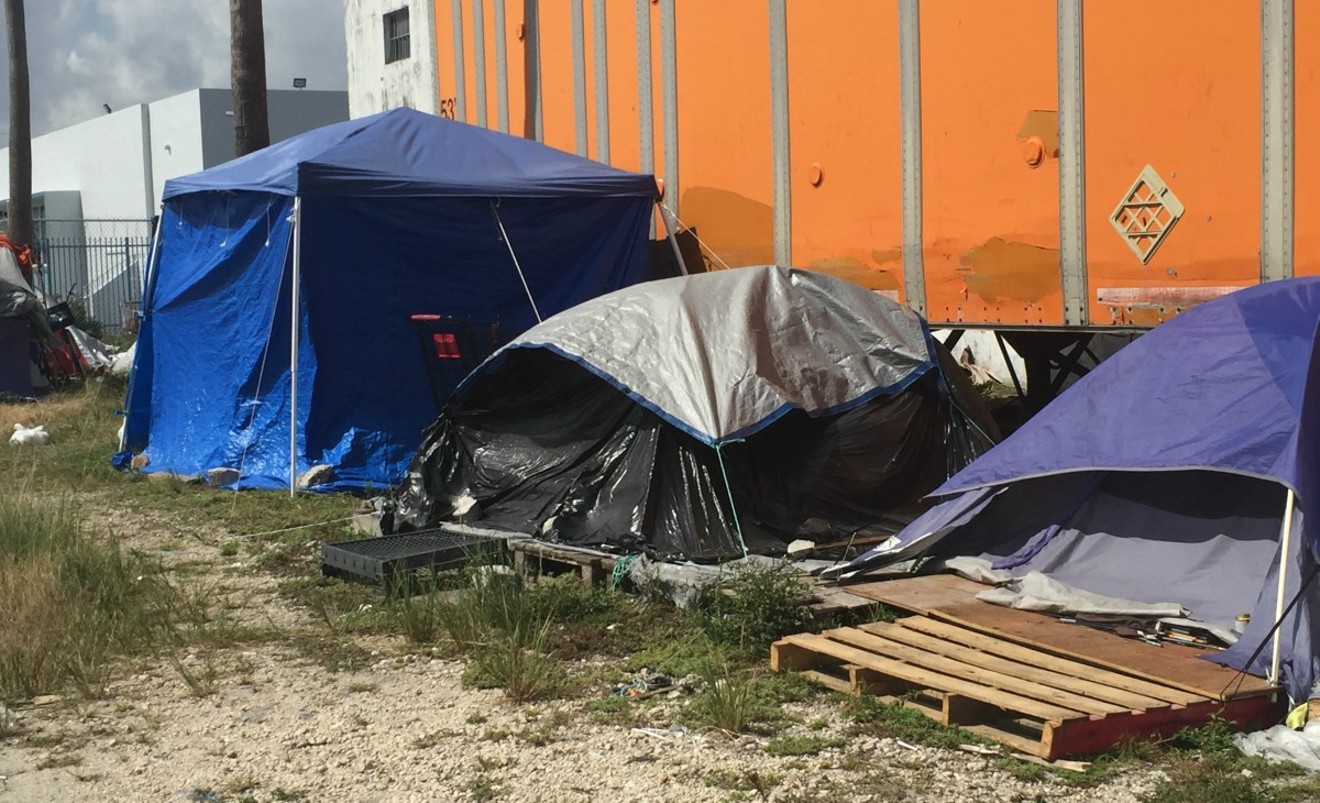Their latest encampment sits near Hialeah by some train tracks, but after New Times wrote about the subhuman conditions at the camp last year, the county vowed to shut it down and clear everyone out. Officials had warned the inhabitants they needed to clear out by yesterday or face arrest — and yesterday a county judge killed a lawsuit that could have prevented the camps from being bulldozed.
"Today, we represented the rights of homeless individuals who are prohibited from residing in most areas of our county and cannot find housing," Legal Services of Greater Miami wrote online yesterday. "We asked the court to stop the county from closing an encampment and thus putting them at risk of arrest for their involuntary homelessness. The request was denied."
Legal Services had joined the Florida chapter of the American Civil Liberties Union and the nonprofit Florida Justice Institute in asking a court to declare the county's residency rules "cruel and unusual punishment" and therefore unconstitutional. The groups are not asking courts to go easy on convicted sex criminals, but justice-reform advocates say Miami's residency restrictions actually harm public safety by forcing former felons into a lifetime of homelessness.Our statement regarding today’s ruling in the encampment case. pic.twitter.com/peQghcHccb
— Legal Services of Greater Miami (@_LSGMI_) May 10, 2018
The rules currently bar offenders from living within 2,500 feet of a school (significantly farther than Florida's state rule of 1,000 feet
In 2013, dozens of registered offenders set up a tent city near NW 71st Street and NW 36th Court, an industrial corner near the train tracks. By last year, 233 registered offenders lived there. Now it will be shut down.
The residents, in turn, will almost certainly find a new place to sleep outdoors. The county had initially suggested banishing the group to Krome Avenue near the Everglades, but local officials stopped promoting that idea after neighbors in the area complained.
According to the Miami Herald's Doug Hanks, Miami-Dade Circuit Judge Pedro Echarte Jr. said the four offenders who had sued didn't have
"Conditions so bad that most of us would not want our family pets living there," Echarte said, per the Herald. "Sadly, neither the outcome of this
Earlier this week, the man in charge of homeless services in Miami-Dade County — pugnacious superlobbyist Ron Book — appeared on CBS Miami to debate ACLU of Florida lawyer Jeanne Baker. Book, who is one of the biggest reasons Miami has a homeless-sex-offender-camp problem, yelled at Baker while claiming the ACLU "wants" to keep homeless offenders stuck outdoors, a claim Baker dismissed as ludicrous.
Now, the latest court ruling — absent any changes in Miami's residency laws — guarantees another camp will spring up somewhere soon.Heeeeeey maybe the random gazillionaire lobbyist inexplicably in charge of homeless services in Miami shouldn't scream at the ACLU on TV and claim the @ACLUFL wants people to be homeless https://t.co/i1ehenFo9z
— Jerry Iannelli (@jerryiannelli) May 10, 2018
"Our clients are disappointed that the county can close the encampment and are reviewing their options," Legal Services announced. "Due to the difficulty of finding housing, they will likely relocate to another street corner, new encampments will form, and this cycle will continue."












